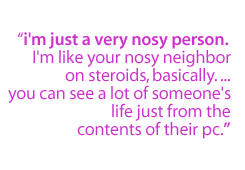 | 


 | 
 |
 | 
Curador is a 18-year old hacker from rural Wales who in the winter of 2000
stole an estimated 26,000 credit cards numbers from a group of e-commerce web
sites and posted the numbers on the web. After ex-hacker Chris Davis tracked
him down, he was arrested on March 23, 2000, and charged under the United
Kingdom's computer crime statute. |  |
 |
 |
What kind of thrill do you get out of hacking? Is it sort of the New Age
equivalent of sex, drugs and rock-and-roll?
I suppose you could call it that, in a way. After the first ten minutes, when
I was waiting for the five and a half thousand credit cards I was to download
from the first site . . . certainly there was a great rush, so to speak. You
do get a rush from doing it--definitely. There is a lot of adrenaline, if
nothing else, while you're trying to track it down. I sometimes spent two days
solid trying to do something without sleep, without anything, just constantly
trying to do it. And when you finally get through, the relief is not just from
the fact that you got it, but now you can sleep. . . .

But what is the incentive that keeps you doing it? It's not as if you're
going to get the secrets that are going to make you a wealthy man all of a
sudden.
 When I'm 28, definitely, I'll have either gone to university or be starting. You never know who's got what in their PC at the end of the day. When you get
on to one PC and one network and that network's getting through another
network, you might get in somewhere really interesting. You might find out
that there's going to be a new "X-Files" show. You might find anything. When I'm 28, definitely, I'll have either gone to university or be starting. You never know who's got what in their PC at the end of the day. When you get
on to one PC and one network and that network's getting through another
network, you might get in somewhere really interesting. You might find out
that there's going to be a new "X-Files" show. You might find anything.

Is that really worth staying up all night for?
I think so yes, basically. . . .

What do computers give you back?
Computers are my career as well. I can get paid for doing the kind of work
that I do. And you get a lot back in satisfaction, really, from writing
programs and things like that, finding new ways of doing things, maybe figuring
out a new way to perform a neural network for artificial intelligence, which is
something I'm really interested in. . . .

But you're like a burglar who breaks into the houses just to see what's in
there. You don't take anything. What's the point?
I think, obviously, I'm just a very nosy person. I'm like your nosey neighbor
on steroids, basically. It can be interesting, because when you see into
someone's computer, it gives you an idea of how they work, who they speak to,
what they're interested in, whether they actually do any work, what their job
is. You can see a lot of someone's life just from the contents of their PC.
Some people even have correspondence with their family at home from their PCs,
and so on. So it just depends.

What are you going to be doing in ten years?
I do want to go to university at some point in time. I'd like to
try and get some kind of research grant or something, and . . . go into
artificial intelligence in a big way, robotics, making equipment for the
disabled, basically increasing the quality of their lives. Just looking for
things and ways for computers to interact with people better, so that you feel
a lot more at home with the computer. . . .

That's what you're going to do . . . if you're not in jail?
Indeed, if I'm not in jail. If I'm in jail, then I'm going to lift a lot of
weights. Not much else. . . .

You didn't break in and take all those credit card numbers just to show the
world how stupid and sloppy these people were. What were you really
after?
Well, if I was trying to do something else, you seem to know more about it than
me, because quite literally, I don't know. . . .

What's your fascination with credit card numbers?
They're a good choice. People don't like other people to know they have their
credit card numbers. . . .

That's because people that get them use them to buy stuff.
Yes.

Is that why you were getting them?
No, I didn't try and buy anything with them that wasn't refunded. . . . There
are loads of things I could've used them for. . . . But I didn't. The whole
point of it was the message.

And what was the message?
There are a lot of people out there who won't even safeguard their own safety,
let alone the safety of their customers. At the end of the day, it's the fault
of these companies. The buck does stop with them. . . . But they're not even
trying to protect their own business from that.

home · who are hackers? · risks of the internet · who's responsible · how to be vigilant · interviews
discussion · video excerpts · synopsis · press · tapes · credits
FRONTLINE · wgbh · pbs online
some photos copyright ©2001 photodisc
web site copyright WGBH educational foundation |  |